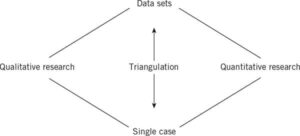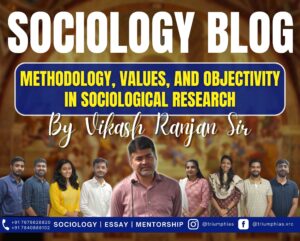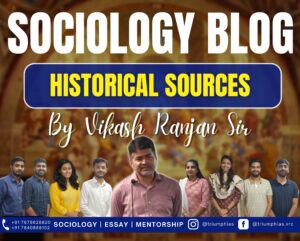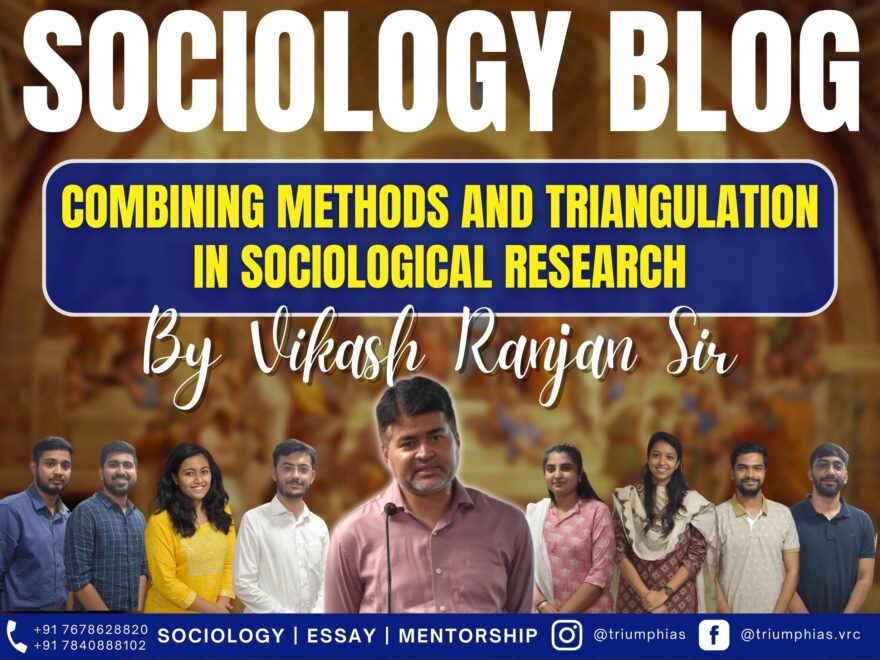Combining methods and triangulation
(Relevant for Sociology Optional for Civil Services Examination)


Combining methods
- Combining different methods is sometimes referred to as methodological pluralism and sometimes as triangulation.
- The practice of merging quantitative and qualitative research has a long-standing history, as seen in Weber’s approach.
- Bryman proposed that the ongoing debate between qualitative and quantitative research may seem overly polarized to someone outside the field of sociology, and a dispassionate observer not involved in the debate might suggest a more pragmatic approach, combining both types of methods
- Bryman observes that it is typical for sociological researchers to center their studies on one of the two methods, but then to bolster the credibility of their findings using the alternative method.
Example of combining methods
Eileen Barker: In her research of the Unification Church, or Moonies, Eileen Barker employed participant observation, questionnaires, and in-depth interviewing.
She argued that this mix of methods enabled her to understand how the movement was structured overall and how it shaped the daily activities and interactions of its members. She sought to validate hypotheses derived from qualitative data using questionnaires.
Multiple aspects in which triangulation can help us to shape research in multiple ways:
According to Bryman, the main advantage of triangulation is that it increases confidence in the research findings.
- Qualitative research might be useful for generating hypotheses to be tested in quantitative research. It might also be used to aid measurement. For example, it can help researchers to operationalize complex concepts in questionnaires through an understanding of what the concepts mean to those being studied.
- Quantitative research facilitates qualitative research. A good example of this is when questionnaires are used to identify people suitable for inclusion in a sample to be studied using qualitative methods. This can save researchers a lot of time which would otherwise be wasted in carrying out research on people from whom no useful data are likely to be obtained.
- Sometimes research might employ one main method but find that this leaves gaps in the data which need to be filled. For example, William Foot Whyte (1955) interviewed ‘Doc’. a leader of the street-corner gang he was studying using participant observation.
- In some circumstances quantitative methods are used to study the more stable aspects of social life while qualitative methods are employed to study changes.
- It helps in understanding and differentiating both researchers’ and participants’ perspectives. In this case, a researcher uses qualitative data to understand the point of view of the people being studied, and quantitative data to examine the specific issues that the researcher has chosen to investigate.
- It helps in dealing with the problem of generality. Qualitative research usually employs a small sample for practical reasons. It may be supplemented by quantitative research using a larger sample to make it possible to generalize the findings.
- Qualitative research facilitating the interpretation of the relationship between variables. Quantitative research might identify general patterns, but qualitative research can help to explain why those patterns exist.
- It helps in studying different aspects of a phenomenon. Different aspects of a phenomenon might lend themselves to the use of different research methods. Quantitative methods were used to find out about what people thought family obligations were in theory while qualitative methods were used to examine how they actually worked in practice.
- Sometimes research throws up unexpected results that are hard to explain. Researchers might need to use a different method from that used initially to try to understand their findings.
Conclusion
Bryman contends that both qualitative and quantitative research have their respective merits. Neither can produce wholly valid and entirely reliable data, but both can offer valuable insights into social life. Bryman suggests that quantitative data can represent the ways in which social life is structured, while qualitative data can better express its processes.
However, Bryman does not view methodological pluralism as a cure-all for research issues. He recognizes that plural methodologies can offer deeper insights than a single methodology alone and that employing multiple methodologies may make a study’s results more compelling.

To master these intricacies and fare well in the Sociology Optional Syllabus, aspiring sociologists might benefit from guidance by the Best Sociology Optional Teacher and participation in the Best Sociology Optional Coaching. These avenues provide comprehensive assistance, ensuring a solid understanding of sociology’s diverse methodologies and techniques.
META TAGS: sociological research, methodological pluralism, triangulation, combining methods, quantitative research, qualitative research, Weber, Bryman, Eileen Barker, Unification Church, Moonies, participant observation, questionnaires, in-depth interviewing, William Foot Whyte, Doc, street-corner gang, generality, operationalize, hypotheses, credibility, validity, reliability, insights, social life, structured, processes, methodologies, compelling results, research problems, advantages, study aspects, unexpected results, stable aspects, social changes, researchers’ perspectives, participants’ perspectives, general patterns, data gaps, complex concepts, small sample, large sample, plural methodologies
 |
 |
Explore Sociology Optional Syllabus
Paper-1
FUNDAMENTALS OF SOCIOLOGY
- Sociology – The Discipline
- Sociology as Science:
- Research Methods and Analysis:
- Sociological Thinkers:
- Karl Marx- Historical materialism, mode of production, alienation, class struggle.
- Emile Durkheim- Division of labour, social fact, suicide, religion and society.
- Max Weber- Social action, ideal types, authority, bureaucracy, protestant ethic and the spirit of capitalism.
- Talcott Parsons- Social system, pattern variables.
- Robert K. Merton- Latent and manifest functions, conformity and deviance, reference groups.
- Mead – Self and identity.
- Stratification and Mobility:
- Concepts- equality, inequality, hierarchy, exclusion, poverty and deprivation.
- Theories of social stratification- Structural functionalist theory, Marxist theory, Weberian theory.
- Dimensions – Social stratification of class, status groups, gender, ethnicity and race.
- Social mobility- open and closed systems, types of mobility, sources and causes of mobility.
- Works and Economic Life:
- Social organization of work in different types of society- slave society, feudal society, industrial /capitalist society
- Formal and informal organization of work.
- Labour and society.
- Politics and Society:
- Sociological theories of power.
- Power elite, bureaucracy, pressure groups, and political parties.
- Nation, state, citizenship, democracy, civil society, ideology.
- Protest, agitation, social movements, collective action, revolution.
- Religion and Society:
- Sociological theories of religion.
- Types of religious practices: animism, monism, pluralism, sects, cults.
- Religion in modern society: religion and science, secularization, religious revivalism, fundamentalism.
- Systems of Kinship:
- Family, household, marriage.
- Types and forms of family.
- Lineage and descent.
- Patriarchy and sexual division of labour.
- Contemporary trends.
- Social Change in Modern Society:
- Sociological theories of social change.
- Development and dependency.
- Agents of social change.
- Education and social change.
- Science, technology and social change.
Paper-2
INDIAN SOCIETY: STRUCTURE AND CHANGE
INTRODUCING INDIAN SOCIETY
- Perspectives on the study of Indian society:
- Indology (GS. Ghurye).
- Structural functionalism (M N Srinivas).
- Marxist sociology (A R Desai).
- Impact of colonial rule on Indian society :
- Social background of Indian nationalism.
- Modernization of Indian tradition.
- Protests and movements during the colonial period.
- Social reforms.
SOCIAL STRUCTURE
- Perspectives on the study of Indian society:
- The idea of Indian village and village studies.
- Agrarian social structure – evolution of land tenure system, land reforms.
- Caste System:
- Perspectives on the study of caste systems: GS Ghurye, M N Srinivas, Louis Dumont, Andre Beteille.
- Features of caste system.
- Untouchability – forms and perspectives.
- Tribal communities in India
- Definitional problems.
- Geographical spread.
- Colonial policies and tribes.
- Issues of integration and autonomy.
- Social Classes in India:
-
- Agrarian class structure.
-
-
- Industrial class structure.
- Middle classes in India.
-
- Systems of Kinship in India:
- Lineage and descent in India.
- Types of kinship systems.
- Family and marriage in India.
- Household dimensions of the family.
- Patriarchy, entitlements and sexual division of labour
- Religion and Society:
- Religious communities in India.
- Problems of religious minorities.
- Patriarchy, entitlements and sexual division of labour
SOCIAL CHANGES IN INDIA
- Visions of Social Change in India:
- Idea of development planning and mixed economy
- Constitution, law and social change.
- Education and social change.
- Rural and Agrarian transformation in India:
- Programmes of rural development, Community Development Programme, cooperatives,poverty alleviation schemes
- Green revolution and social change.
- Changing modes of production in Indian agriculture.
- Problems of rural labour, bondage, migration.
3. Industrialization and Urbanisation in India:
-
- Evolution of modern industry in India.
- Growth of urban settlements in India.
- Working class: structure, growth, class mobilization.
- Informal sector, child labour
- Slums and deprivation in urban areas.
4. Politics and Society:
-
- Nation, democracy and citizenship.
- Political parties, pressure groups , social and political elite
- Regionalism and decentralization of power.
- Secularization
5. Social Movements in Modern India:
-
- Peasants and farmers movements.
- Women’s movement.
- Backward classes & Dalit movement.
- Environmental movements.
- Ethnicity and Identity movements.
6. Population Dynamics:
-
- Population size, growth, composition and distribution
- Components of population growth: birth, death, migration.
- Population policy and family planning.
- Emerging issues: ageing, sex ratios, child and infant mortality, reproductive health.
7. Challenges of Social Transformation:
-
- Crisis of development: displacement, environmental problems and sustainability
- Poverty, deprivation and inequalities.
- Violence against women.
- Caste conflicts.
- Ethnic conflicts, communalism, religious revivalism.
- Illiteracy and disparities in education.
Why Vikash Ranjan’s Classes for Sociology?
Proper guidance and assistance are required to learn the skill of interlinking current happenings with the conventional topics. VIKASH RANJAN SIR at TRIUMPH IAS guides students according to the Recent Trends of UPSC, making him the Best Sociology Teacher for Sociology Optional UPSC.
At Triumph IAS, the Best Sociology Optional Coaching platform, we not only provide the best study material and applied classes for Sociology for IAS but also conduct regular assignments and class tests to assess candidates’ writing skills and understanding of the subject.
Choose The Best Sociology Optional Teacher for IAS Preparation?
At the beginning of the journey for Civil Services Examination preparation, many students face a pivotal decision – selecting their optional subject. Questions such as “which optional subject is the best?” and “which optional subject is the most scoring?” frequently come to mind. Choosing the right optional subject, like choosing the best sociology optional teacher, is a subjective yet vital step that requires a thoughtful decision based on facts. A misstep in this crucial decision can indeed prove disastrous.
Ever since the exam pattern was revamped in 2013, the UPSC has eliminated the need for a second optional subject. Now, candidates have to choose only one optional subject for the UPSC Mains, which has two papers of 250 marks each. One of the compelling choices for many has been the sociology optional. However, it’s strongly advised to decide on your optional subject for mains well ahead of time to get sufficient time to complete the syllabus. After all, most students score similarly in General Studies Papers; it’s the score in the optional subject & essay that contributes significantly to the final selection.
“A sound strategy does not rely solely on the popular
Opinion of toppers or famous YouTubers cum teachers.”
It requires understanding one’s ability, interest, and the relevance of the subject, not just for the exam but also for life in general. Hence, when selecting the best sociology teacher, one must consider the usefulness of sociology optional coaching in General Studies, Essay, and Personality Test.
The choice of the optional subject should be based on objective criteria, such as the nature, scope, and size of the syllabus, uniformity and stability in the question pattern, relevance of the syllabic content in daily life in society, and the availability of study material and guidance. For example, choosing the best sociology optional coaching can ensure access to top-quality study materials and experienced teachers. Always remember, the approach of the UPSC optional subject differs from your academic studies of subjects. Therefore, before settling for sociology optional, you need to analyze the syllabus, previous years’ pattern, subject requirements (be it ideal, visionary, numerical, conceptual theoretical), and your comfort level with the subject.
This decision marks a critical point in your UPSC – CSE journey, potentially determining your success in a career in IAS/Civil Services. Therefore, it’s crucial to choose wisely, whether it’s the optional subject or the best sociology optional teacher. Always base your decision on accurate facts, and never let your emotional biases guide your choices. After all, the search for the best sociology optional coaching is about finding the perfect fit for your unique academic needs and aspirations.
Follow us :
🔎 https://www.instagram.com/triumphias
🔎https://www.youtube.com/c/TriumphIAS
https://t.me/VikashRanjanSociology
Find More Blogs
|
Scope of the subject and comparison with other social sciences |
|||
|
|
|
|
Modernity and social changes in Europe |


2 comments